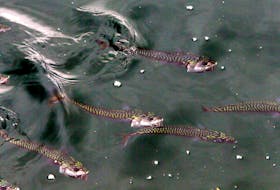ST. JOHN'S, N.L. — There's been a large swath of research over the years pointing to an increased severity of weather events in the years ahead due to the effects of climate change.
Joel Finnis, a climatologist and professor in Memorial University's geography department, is familiar with lots of the research out there. The provincial government commissioned him to complete a summary of expected climate change impacts for Newfoundland and Labrador in 2013, and he updated that report five years later. Both reports were informed by a wealth of analyzed data.
With no classes to tend to during the state of emergency in St. John's, Finnis has had lots of time to think about last week's weather event through the lens of his professional expertise.
"I’ve had a few exchanges with colleagues about this already — specifically, whether climate change contributed to this event and whether we can expect this to happen more frequently in the future," he told The Telegram.
"It’s safe to say that a storm like this will remain a rare event. I’m sure it’ll go down as the worst winter storm of my lifetime in terms of wind and rapid snow accumulation."
As Finnis describes it, eastern Newfoundland was basically hit dead-on by a weather bomb, which he characterizes as a storm that strengthens and develops quickly. He said there are plenty of weather bombs that swing through Atlantic Canada, and probably more on the way this winter.
"This was a particularly strong one, but certainly not unprecedented," he said, adding if the storm followed a slightly different path or moved faster, it would have been a different story for eastern Newfoundland.
As for climate change's impact on the storm, Finnis said it is difficult to discern.
"A lot of things will likely change with weather bombs, including their preferred tracks, their frequency, their average strength, the amount of water they contain and the character of the snow they produce."
Depth of snow
The character of the snow as average mean temperatures rise over the years and decades ahead will be noticeable. Finnis points to the fact drier, colder air leads to snow producing greater depths.
Delving further into the snow, he suggests it is helpful to think about the ratio of snow depth to the depth of water it contains. For starters, climate change will produce storms dumping higher volumes of water. The light snow produced in dry, cool air may produce a ratio of 100 centimetres of snow for each centimetre of water. By comparison, the wetter variant of snow produced in warmer or milder weather would amount to 10 centimetres of snow for each centimetre of water, ultimately reducing the depth of snow.
"On balance, I’d expect warming to leave us with more of the dense ten-to-one stuff, and a much reduced chance of the lighter and deeper stuff we saw last week. Putting it all together, I’d be surprised to ever see 77 centimetres in a single day again.
"We’ll see weather bombs in the future — very possibly this winter — but getting a direct hit like this becomes less likely under climate change. Even as the snow they produce likely shifts away from deeper and lighter accumulation towards the shallower, heavier, slushier stuff. I mean, it’s clearly possible to see a similar or even worse storm, but they should remain uncommon."
Finnis noted there is some 2016 research Environment and Climate Change Canada scientist Christian Seiler completed with colleagues pointing toward a potential decrease in the frequency of weather bombs, though they could be more intense through stronger winds. There are also some tentative findings out there to suggest weather bombs will track further north in the future.
Twitter: @CBNAndrew








